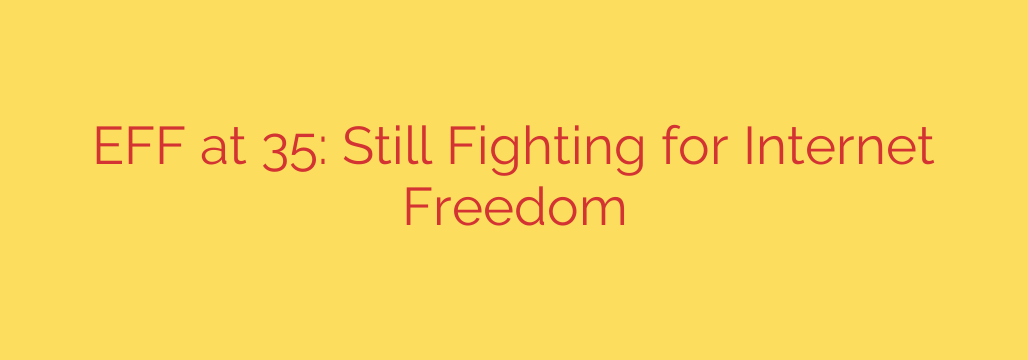
Guarding Our Digital Freedoms: The 35-Year Battle for an Open Internet
Every day, we send private messages, browse websites, and share our thoughts online, often taking for granted the freedoms that make it possible. But the digital world as we know it wasn’t a given; it was built on a foundation of rights that have been fiercely defended for over three decades. As the internet has evolved from a niche academic network into the backbone of modern society, a quiet but critical battle has raged to ensure it remains a place for free expression, privacy, and innovation.
This fight began in the early 1990s, a time when the digital frontier felt like the Wild West. Law enforcement and government agencies, often misunderstanding the nascent technology, struggled to apply old laws to this new world. This led to misguided raids and seizures of equipment from early online communities and tech pioneers. It became clear that the digital realm needed its own defenders—experts who understood both the technology and the law, dedicated to protecting civil liberties online.
Key Battlegrounds in the Fight for Digital Rights
Over the years, the struggle for a free and open internet has been fought on multiple fronts. These core battles have shaped the rights and expectations we have today.
1. The Right to Private Conversations: The Encryption Wars
In the early days of the internet, the U.S. government classified strong encryption technology as a “munition,” severely restricting its export and availability. The argument was that if encryption was widely available, it would be used by criminals and terrorists to hide their communications.
However, privacy advocates knew that without strong encryption, there could be no true privacy online. Every email, financial transaction, and private conversation would be vulnerable to eavesdroppers, corporations, and government surveillance. The fight was to establish a crucial principle: strong encryption is a fundamental tool for personal security and a form of protected speech. This legal and public battle was eventually won, paving the way for the secure e-commerce, private messaging apps, and encrypted connections (HTTPS) that we rely on daily.
2. Pushing Back Against Mass Surveillance
The landscape shifted dramatically after 9/11, as governments around the world expanded their surveillance powers in the name of national security. For years, digital rights activists warned of secret programs that were collecting massive amounts of data on innocent citizens without warrants.
These warnings were confirmed in 2013 with the Snowden revelations, which exposed the vast scale of global surveillance programs. This brought the fight into the public spotlight, leading to landmark legal challenges against warrantless wiretapping and the bulk collection of phone records. The core of this ongoing fight is simple: the government must be held to constitutional standards, even when using new technology. The battle to rein in unchecked surveillance and demand transparency continues to this day.
3. Defending Free Expression and an Open Platform
Who is responsible for what gets said online? This question is at the heart of the fight for free expression. Early legal frameworks were established to ensure that the platforms hosting our conversations—from internet service providers to social media networks—were not held legally responsible for the content their users posted.
This protection has been essential for creating the vibrant, user-driven internet we know. It allows platforms to host a wide range of speech without fear of being sued into oblivion for something a user said. While debates around content moderation are more intense than ever, protecting online platforms from automatic liability for user speech remains crucial for maintaining the internet as a public square for diverse voices.
The New Frontier: Today’s Digital Rights Challenges
While old battles continue, new challenges are constantly emerging. The fight for internet freedom today is focused on several key areas:
- The Power of Big Tech: The dominance of a few large technology companies creates new threats to competition, innovation, and free expression. These companies act as gatekeepers, and their decisions about algorithms and content moderation have a massive impact on public discourse.
- The Spread of AI and Biometric Surveillance: Facial recognition, AI-powered predictive policing, and other biometric technologies pose an unprecedented threat to privacy and anonymity. Fighting for strong regulations to limit their use is a top priority.
- The Internet of Things (IoT): Smart devices in our homes, from speakers to refrigerators, collect vast amounts of personal data. Ensuring this data is secure and not used against us is a critical new frontier for consumer privacy.
How You Can Protect Your Digital Freedom
The fight for a better internet isn’t just for lawyers and activists. We can all take steps to protect our own privacy and support a healthier digital ecosystem.
- Use Encrypted Services: Choose messaging apps with end-to-end encryption, such as Signal or WhatsApp. Ensure the websites you visit use HTTPS (look for the lock icon in your browser’s address bar).
- Strengthen Your Privacy Settings: Regularly review the privacy settings on your social media accounts, apps, and devices. Limit the data you share and turn off location tracking for apps that don’t need it.
- Use Privacy-Focused Tools: Consider using browsers like Brave or Firefox with enhanced privacy protections, and search engines like DuckDuckGo that don’t track your search history. A reputable VPN can also help protect your browsing activity from your internet service provider.
- Stay Informed: The rules of the internet are being written right now in courts and legislatures. Pay attention to proposed laws related to tech, privacy, and surveillance.
The internet is one of the most important resources in human history. For 35 years, advocates have worked to ensure it develops as a force for freedom and not one of control. This work is far from over. By understanding the challenges and making conscious choices, we can all play a role in ensuring the next 35 years of the internet are built on a foundation of privacy, free speech, and user empowerment.
Source: https://go.theregister.com/feed/www.theregister.com/2025/07/24/eff_turns_35/








